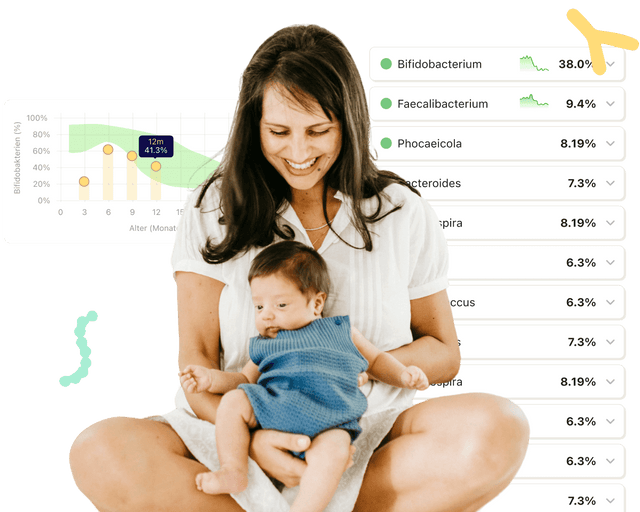Vitamin D3
400 IU / 200% NRV
Vitamin D3, also known as Cholecalciferol, is crucial for the health of infants and children. It supports the body in building and maintaining strong bones by promoting calcium absorption in the intestines. A deficiency in Vitamin D3 can contribute to rickets in babies, a condition that leads to soft and weak bones. Additionally, Vitamin D3 plays important roles in the immune system and helps to fend off infections. In Germany, it is recommended to administer a Vitamin D3 supplement containing 400 IU, like the Ventra Baby Drops, to infants from the first week of life.
Total Bacterial Cultures
300 Million / 3x10^8 CFU
Our carefully selected bacterial cultures in the Ventra Baby Drops are more than just ingredients – they are vital microorganisms that support the growth and development of a healthy Microbiome in your baby. Each culture was chosen for its specific properties and benefits to promote the gut health and immune system of your child. We understand how critical the first years of life are for overall health, and have spared no effort in developing a formula that meets this crucial developmental phase.
We have intentionally chosen a dosage of 300 million colony forming units (CFU) to provide effective, yet gentle support for your baby's developing gut ecosystem. This deliberate choice reflects our understanding that overburdening the sensitive Microbiome of babies should be avoided. Unlike probiotics for adults, where high amounts of bacteria might be required, this lower number is sufficient for babies to promote healthy colonization and development of the Microbiome.
Bifidobacterium infantis
SD6720
Bifidobacterium infantis has the remarkable ability to internally metabolize Human Milk Oligosaccharides (HMOs), giving it an advantage over other gut bacteria. After breaking down the HMOs, it produces short-chain fatty acids, which both promote gut health and create an environment that is unfavorable for harmful bacteria. Thus, B. infantis plays a central role in the development of a healthy gut ecosystem in infants.
Bifidobacterium breve
SD5206
Bifidobacterium breve is a key player in the microbiome of infants and is present in the largest amounts in the infant's gut. This presence could be partly due to its transmission from the mother during birth and through breast milk. B. breve metabolizes Human Milk Oligosaccharide (HMO) externally, thereby potentially releasing beneficial by-products for other gut bacteria. This interaction supports overall gut health and the microbial balance of the infant.
Bifidobacterium longum
DSMZ 32946
Bifidobacterium longum subsp. longum is present in the microbiome of infants to adults and dominates our data as the most commonly occurring strain. Unlike B. breve, which specializes in breast milk carbohydrates, B. longum subsp. longum is characterized by its ability to metabolize a wide range of carbohydrates, including plant fibers. This adaptability makes it particularly relevant during the introduction of solid foods, supports digestion, and contributes to gut health.
Bifidobacterium bifidum
DSMZ 32403
Bifidobacterium bifidum specializes in the breakdown of mucopolysaccharides in the gut mucosa, allowing it to settle close to the gut mucosa and protect against potential pathogens. Unlike B. longum and B. breve, which prefer plant fibers or HMOs, B. bifidum also utilizes mucous substrates as a food source. This gives it a colonization advantage in the infant's gut, especially in early stages of life, and contributes to supporting digestion and healthy development of the gut mucosa.
Lacticaseibacillus rhamnosus
DSMZ 26357
Lacticaseibacillus rhamnosus, a probiotic bacterium commonly found in dietary supplements and fermented foods, is known for its positive effects on the immune system and digestive tract. It can metabolize a variety of carbohydrates, producing lactic acid that acidifies the intestinal environment and thus contributes to the defense against harmful pathogens. However, L. rhamnosus does not tend to permanently settle in the infant's gut. Nevertheless, studies show that certain strains, like those in Ventra Baby Drops, can reduce crying frequency and restlessness in infants with colic.
Lactiplantibacillus plantarum
DSMZ 34532
Lactiplantibacillus plantarum, formerly known as Lactobacillus plantarum, plays a crucial role in the development of the baby's gut microbiome. This lactic acid bacterium, commonly found in fermented foods, can help babies build a healthy gut flora and strengthen the immune system. Moreover, L. plantarum has the potential to settle in the gut, thus contributing to the long-term gut health of babies.
Fructooligosaccharides (FOS)
Fructooligosaccharides (FOS) are prebiotic fibers that can promote the growth of beneficial gut bacteria, especially Bifidobacteria, in babies. They serve as a food source for these helpful bacteria, thereby contributing to the development of a healthy gut microbiome. Supplementing a baby's diet with FOS can thus help to strengthen the baby's immune system and improve gut health.

















